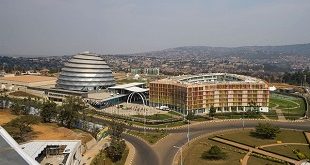
By Joan Akello
Mike J. Chibita, the Director of Public Prosecutions (DPP)spoke journalists including The Independent’s Joan Akello in a talk organised by African Centre for Media Excellence (ACME) in Kampala. Below are excerpts.
What is DPP’s place in delivering justice?
Justice is a very elusive concept; justice and law are not necessarily bed fellows. What we do is to enforce the law and unfortunately many times enforcing the law does not deliver justice. As prosecutors, we are in between the public and the police who go to the public to investigate. We deal with secondhand information and we try to make the best of this evidence and take it to court to prove beyond reasonable doubt in criminal cases. That is an uphill task convincing a judicial officer that somebody who is presumed innocent is guilty yet the police have handicaps and the evidence has gaps.
Legal practitioners will say police is arresting before investigating while the public will say we are not doing anything like arresting anyone for Katosi. The best is for us to do our work at our pace. To have a foolproof case takes time. We prosecutors are between the investigators and the judiciary. As a judge you can sit in your office, write a judgment, and read it and whoever does not agree with it can appeal. That is how far you go with the public. But to make a decision to or not to prosecute is quite a ceremony at DPP because my office is public. Some say why you should while others say why you should not prosecute while others complain and go to the newspapers.
What changes have you made in the past one year as DPP?

The directorate was highly centralised but now we have set up regional offices at each of the 12 High Court circuits with one regional officer. We have procured case management software worth $1.5million (about Shs 4 billion) to track files which have been ‘disappearing’ online, and administration and management of cases will be easy from regional offices at the directorate and the software will generate statistics for us. I have been able to tour the whole country to familiarise myself with my office and met stakeholders. There has been stagnation of promotions because our structure has been top light with the DPP, two deputy DPPs and three assistant DPPS and so many Principal State Attorneys but the Public Service Commission (PSC) has approved our new structure beginning next financial year with more posts upstairs and we will be recruiting 100 staff following the interviews and no file has disappeared in my one year.
What is your commitment to build public trust in DPP since there are issues such as files disappearing, withdrawing cases?
A file disappearing is a myth. Unfortunately I cannot address public rallies to tell them what we are doing that is why we hope to build a partnership by talking to the media. We do not have enough money to buy space, but we have a PRO and open to the public; to somebody who has a complaint or suggestion.
What challenges are suspects you prosecute posing currently?
Lately, there is a trend of criminal suspects we are prosecuting running to the civil court to stop our investigations. We have about ten of these cases for instance we are prosecuting Cairo Bank in the pension case and they ran to the civil court and got an interim order to stop us from pursuing them. Once they go to civil court, we cannot go to argue our case because our area is criminal and we have to rely on the Attorney General who also has its own priority. Someone who does not understand the rule of law will say it is a circus because it is the same government that prosecutes and also releases the criminals.
What do you want to achieve by advocating for plea bargain?
The press reported recently that the police are not happy because DPP is negotiating with criminals. Are we supposed to make everybody happy? Ask all the stakeholders; the prisons officers at Luzira, the judiciary, or the people who have participated.
We had two traffic cases; one of them was the Nsenga case. I offered them plea bargain that I would reduce the charge to manslaughter if you plead guilty. We do not force anybody into plea bargain and they preferred not to take it. We went full prosecution and got a murder conviction and it took much longer. We had another traffic offence where a person was killed and the person pleaded guilty to manslaughter and the case went to the chief magistrates’ court rather than before a judge. In a plea bargain charge, the judicial system spends Shs100, 000 and if a matter goes to trial the average is Shs1 million. In the US where we benchmarked, they plea bargain 95 percent of their cases.
The Deputy Attorney (DA) of Dallas said they had calculated the cost of feeding an inmate at US$65 a day. So before we send somebody to jail, we ask, are we willing to spend US$65 feeding people on remand yet they can plea bargain and start serving their sentence. Do we ask how much it costs to feed a prisoner at Luzira? Economically and criminologically, plea bargain makes more sense. In a trial, the probability of getting a conviction is 50-50 yet you are sure of conviction when a person pleads guilty. So DPP and the judiciary have decided to use plea bargain because it is a win-win situation for everybody. We shall produce the statistics at the end of the year. The pilot was carried out in Kigo prison with about 260 cases which were cleared in one week by five judges because the prisoners had plea bargained and no witnesses were called which saved a lot of money and human resources. The programme has been rolled out countrywide and sessions have been held in Jinja, and Mukono.
In light of the Nsenga case, how is your relationship with the police?
While the investigators thought that it was a traffic offence, the prosecutors saw it as murder and then the media wrote that so and so is this person’s relative. Luckily we took a decision without knowing who was related to whom. The deputy director CIID testified in court but it was not such a big deal.
How do you handle political interference since you are appointed by the President and it is claimed that the government always gets what it wants?
Truth can be there and people choose to believe something else. I have not suffered any political interference. In fact I have suffered more judicial interference but the public believes there must be some political interference. Having worked at State House, there is that impression but you have to do your job.
 The Independent Uganda: You get the Truth we Pay the Price
The Independent Uganda: You get the Truth we Pay the Price



